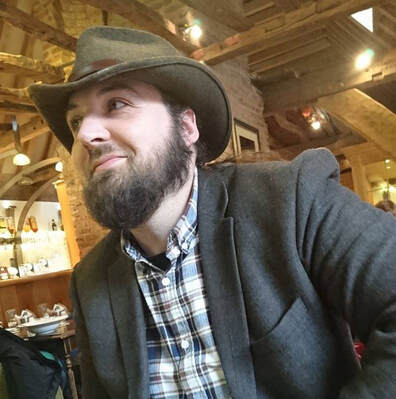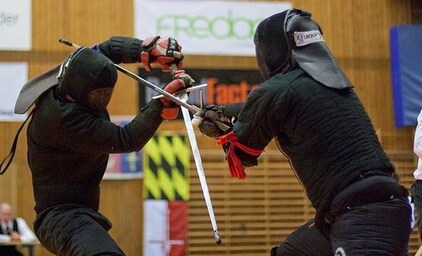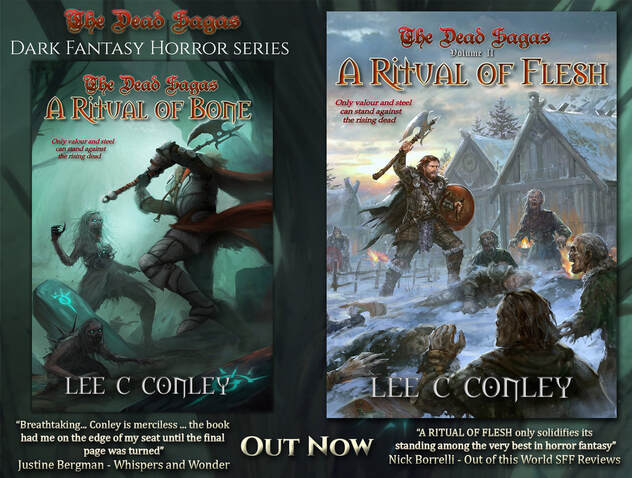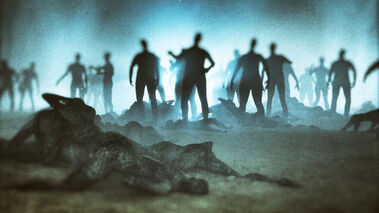|
Welcome Lee! Thanks for taking some time to chat about writing. First, a few quick-fire questions: Sweet or Spicy? Boats or bicycles? And if you could take a COVID-less vacation anywhere in the world where would you go? Quick fire answer - Spicy! Love everything spicy. And Boats! Big fan of boats and maritime history. I spent a lot of time in Plymouth dreaming of the age of sail and naval awesomeness. Also without even a second of thought I would say definitely Mexico for a dream vacation. I love the culture, the history. I love the hot food and tequila. I would love to visit the jungles there too and see the Aztec ruins. It seems like such an interesting place, and I would love to catch the Dia de los Muertos festival too. "Mexico for a dream vacation. I love the culture, the history." Many writers find success in what I call ‘writing adjacent’ pursuits; you are the co-founder of the Bard of the Isles literary magazine, a publication featuring the short stories, articles, and interviews with the British and Irish Writing Community. What was the inspiration for Bard of the Isles and how has it helped support your writing career? Myself and two other writers got together on Twitter a few years ago and decided to found The British and Irish Writing Community. It quickly became a space where all the members can interact and mutually support each other, and it grew and grew. We aim to provide encouragement and advice, and also a pool of resources that our members may find useful. We then launched Bard of the Isles magazine as a publication to showcase our members and which provides the place to continue that support and provides the writing resources that our community finds useful. It has been a great success and the community is absolutely fantastic. It certainly has provided a boost not just to my own visibility but many of our members, and the shared support continues to be a great motivator to my writing. You and I both share a passion for music and, more specifically, for playing the guitar. Both of us began in music before moving into fiction and I wonder if this previous experience feeds into your writing. Do you see these two creative pursuits as overlapping subjects or as quite distinct? What can writers learn from musicians? Guitar is amazing and it’s a huge part of my life, so it’s always a pleasure to chat with a fellow guitar slinger. I work as a professional guitarist for my day job, plus teaching music and working as a sound engineer. There is a definite overlap between my music career and my writing. One example is the character Seth in my latest book, A Ritual of Flesh, who is a musician also. I found my experience in music allowed me to add much more depth and detail into his character, in particular to the scenes where he is performing - and without giving too much away - Seth and his music become quite an important plot-line in the series. "There is a definite overlap between my music career and my writing. One example is the character Seth in my latest book, A Ritual of Flesh, who is a musician also." On the actual “craft of writing” side of things it has no doubt been affected by my music also. I have always written poetry in one form or another, and made use of the verse as lyrics in songs. But now that I have been studying the art of poetry in more depth at university, there has definitely been some influence on my verse style, and in turn that has leaked into my prose, hopefully making some of my prose more poetic. You are also a Historical Martial Arts (HEMA) instructor and specialize in Longsword. Has the resurgence of medieval narratives in the public imagination (I’m thinking particularly Game of Thrones) impacted the sport? What are the major misconceptions new students often bring to the dueling floor? And what do fantasy writers always get wrong about wielding a longsword? We have certainly seen a surge in people wanting to train in medieval martial arts, I think TV shows such as Game of Thrones and The Witcher have certainly had an impact. It’s funny though, some of the preconceptions people have had when they come down. We had one guy tell us he knew all about fighting and thought he’d be really great because he was an “expert” at playing games like Skyrim, so he would know how to fight already - which certainly gave us a chuckle and suffice to say his preconceptions were misplaced. Another thing we get a lot is the duel wielding longswords questions, which simply is not a “thing”. We do use a primary weapon and an off-hand weapon, for example Tomahawk and Knife, or arming sword and buckler, but not two longswords sadly. As far as writers go, a lot of the time many fantasy writers are fairly well researched, but sometimes to the point where they don’t realise just how versatile the longsword can be. It’s usually just a lack of little details, or perhaps too many details until it becomes some sort of sword porn from someone who is versed in the art, rather than things people get wrong. I suppose one common thing I notice is many writers don’t realise how light they are, it is a two handed weapon but they are surprisingly light and not actually that heavy. Another thing I notice is a swordsman taking out five guys at once, usually any more than one or two is a real problem and spells certain death. "As far as writers go, a lot of the time many fantasy writers are fairly well researched, but sometimes to the point where they don’t realise just how versatile the longsword can be." Ok, maybe there are a few things. Another being the sword as some sort of ultimate weapon when in truth a spearman would take out a longswordsman nine times out of ten, the spear is really a much better weapon but it lacks the romantic awesomeness that the sword does. The main thing a fantasy reader wants is a good read and sometimes realism can be a bit mundane or steal the fun, we write fantasy so the fantastic element allows for a bit of creative license, I do however try to keep the fights realistic but entertaining and cinematic also. I find personally there is a fine balance. In your dark epic fantasy series The Dead Sagas you blend the themes of horror and survival in the mythic land of Arnar. One aspect of the in-world history is that Arnar has forgotten its past and now must reckon with forces they do not understand. How do you think fantasy can help us process and address the long-buried issues in our own real-life history? Fantasy is all about escapism and gives us a platform to explore the imagination. There’s my opening line to that question, quite a statement but let me explain. For example sci-fi allows a writer to speculate on future technology or social and political ideas, but fantasy tends - most of the time - to look backwards and gives us a “what if” look at historical settings. In my case what if there were zombies in a dark age society. Also I think speculative fiction speculates on the imagination, speculating on the unknown perhaps? It gives writers that platform to explore what people would do when facing forces and situations they don’t understand. It’s almost an experiment in social commentary, to create a character and explore their human nature in these fantastical situations. By speculating on these concepts we can relate them to our own real life history and address issues that are relevant to real life. "It’s almost an experiment in social commentary, to create a character and explore their human nature in these fantastical situations." One example from my book, and it’s a huge issue this last year, is that of racism. I have a POC character who is treated in different ways, sometimes misunderstood, but I wanted to highlight that experience for that character, in this case Jasper or even Tung also, and progress them so the opinions of the other characters change. I tackle a number of issues, academic ethics, genocide, racial issues, disability, but I tried to make it part of that character rather than focusing too obviously on the issue, it’s more of a subtext if you care to look at it but the main narrative experience is the driving force. These issues, both historically and modern, are important to be tackled by all literature, in fact I’d go so far as to say it is art and literature’s duty to tackle these issues and highlight them, comment on them, and through that somehow improve and progress society by tackling these issues in our work. That got deep. As a fellow speculative fiction writer I know it can be easy to fall into what I like to call ‘trope traps’. How do you explore topics like undead zombies and medieval fantasy while still keeping the characters and the narrative fresh? What advice do you have for newer writers who are getting feedback from editors or beta-readers that their fiction is leaning too heavily on genre tropes? Tropes are a tricky one. Personally I try to subvert a lot of tropes, so if I notice I have used a trope I will try to turn it on its head and give it a clever spin. I think the narrative voice and the characters - the actual story - should take precedence over settings and themes like the zombies. Horror can be an intimately personal thing; it's tapping into a reader’s personal fears to try and create something that scares them. I knew I wanted to write a zombie book in a fantasy world but it's the characters' experiences that bring out the horror, it's seeing it from their eyes and through their fear that brings that sense of horror to actually make a book scary - which is a hard thing to get right. The Dead Sagas is really a story about how the characters survive and their motivations rather than the zombies themselves. The zombies are fun though. On the tropes question, I had to decide how to use two common zombie tropes, the slow shambling zombies or the more modern running ones - which do I use? In the end you’ll see I used both, and it was how I turned those tropes on their head that made the creative process fun and ultimately contributed to the series being well received by its readers so far. As far as advice goes, listen to your beta readers, but don’t let them rule you. Do listen to your editor though, if they are pointing out something that isn’t working, and the beta readers spotted it too, chances are it isn’t working. But to avoid tropes, as I suggest, if you find something is a trope, turn it on its head and subvert it and it makes for a more original and interesting outcome. "As far as advice goes, listen to your beta readers, but don’t let them rule you. Do listen to your editor though, if they are pointing out something that isn’t working..." Can you give us a sneak peek of what your next major project will be? Any hints or perhaps a little snippet to get readers excited? I will be writing the rest of The Dead Sagas in one go I think. It will be two books but I will write them in one consecutive drafting period, the third book will be titled A Ritual of Blood. The main series arc will make four books by the end I think, but there will be scope for perhaps a few standalones in the same world also. Once I have finished the main series, I may well start a different project before I return to any standalones for The Dead Sagas, perhaps some dark sci-fi, maybe a wyrd west, but possibly a different horror fantasy. We’ll see. I am always writing short stories too and have stories that will be appearing in two different anthologies by the end of the year. I do also have plans to release a short story collection, probably very soon as I seem to be amassing some fun short stories and thought it would be nice to release a small collection in the next 6 months, so watch this space. Last, but not least, where can readers find your books and keep up to date on your latest publications? The best place to keep up to date with my work is either on my website or on my social media. I also have a mailing list; I only send out a couple of newsletters a year so please do sign up and then you won’t miss any news!
0 Comments
|
AuthorJoshua Gillingham is an author, editor, and game designer from Vancouver Island, Canada. Archives
April 2022
Categories
All
|






 RSS Feed
RSS Feed
